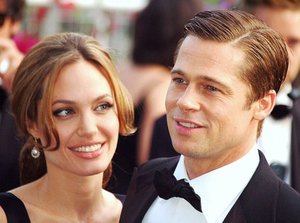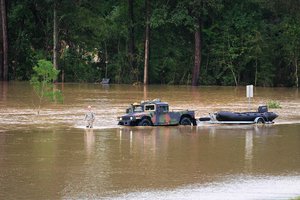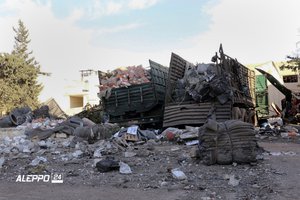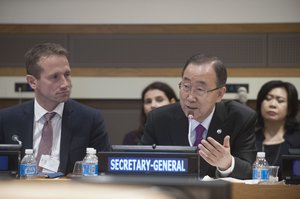Interviews concerning preparation for the match against Finland (Russian Ice Hockey Federation)
Edit Public Technologies 21 Sep 2016
(Source. Russian Ice Hockey Federation) ... - How is it training such a veteran as Pavel Datsyuk? ... Pavel plays on the penalty kill, does well at faceoffs ... - Pavel Datsyuk is an unbelieveable player, he's forever young ... Pavel is the biggest professional which I have come across, he is a key figure for our team ... It's amazing playing in one team with Pavel Datsyuk, it's brilliant to just seen how he trains on the ice and in the gym ... (noodl....
Vladimir Putin allegedly planning to 'revive the KGB'
Edit AOL 20 Sep 2016
President Vladimir Putin is planning to restructure the country's security services, essentially resulting in the rebirth of the Soviet-era style KGB, according to Russian reports ... See photos of Putin. Vladimir Putin ... AFP PHOTO / POOL / PAVEL GOLOVKIN / AFP / POOL / PAVEL GOLOVKIN (Photo credit should read PAVEL GOLOVKIN/AFP/Getty Images). MOSCOW, RUSSIA ... (AP Photo/Pavel Golovkin, Pool) ... (AP Photo/Pavel Golovkin) ... (AP Photo/Pavel Golovkin)....
NATO Military Committee holds Conference in Split (Ministry of Defence of the Croatian Republic)
Edit Public Technologies 20 Sep 2016
In his opening address the Chairman of the Military Committee, General Petr Pavel praised Croatia's active role within the Alliance ... The working sessions within the Military Committee Conference were concluded with a joint media conference with the Chairman of the Military Committee, General Petr Pavel and the Chief of the General Staff of the Croatian Armed Forces, General Mirko Šundov....
‘Int'l Terrorism, Not Russia, is the Biggest Threat to NATO and the EU’
Edit Sputnik 20 Sep 2016
NATO plans to deploy four battalions totaling amounting to 4,000 troops in the Baltic region by May 2017, the head of the Western alliance’s military committee, Czech Army General Petr Pavel, said ... ....
Kurukuru's World Cup campaign ... (Oceania Football Confederation)
Edit Public Technologies 20 Sep 2016
(Source. Oceania Football Confederation) ... Hopes of a Solomon Islands comeback diminished after the break, as Pavel Taku, Ilya Mun, Nikolay Pengrin contributed to the Kazakhstan goal total. Despite heading to a heavy defeat, the Kurukuru had chances to find the net themselves....
Possible line-ups: Darmstadt vs Hoffenheim (Bundesliga - DFL Deutsche Fußball Liga GmbH)
Edit Public Technologies 20 Sep 2016
(Source. Bundesliga - DFL Deutsche Fußball Liga GmbH). Official Fantasy Bundesliga Managers take note. bundesliga.com is on hand to provide likely line-ups as well as injury and suspension news ahead of Matchday 4 ... Kerem Demirbay may start in place of Nadiem Amiri and it's also possible that Philipp Ochs or Jeremy Toljan will step in for Pavel Kaderabek. Click here for the the brand-new Match Centre ... Absentees ... Coach ... Absentees....
Russia beats North America as Bobrovsky and offense shine
Edit The Miami Herald 20 Sep 2016
Vladislav Namestnikov, Nikita Kucherov, Evgeny Kuznetsov and Vladimir Tarasenko scored on consecutive shots and Sergei Bobrovsky made 42 saves as Russia beat Team North America 4-3 in a fast-paced, end-to-end game Monday night at the World Cup of Hockey ... No ... The kids put on a show on an early shift as Matthews stole the puck from Alex Ovechkin and Connor McDavid skated around Pavel Datsyuk to set up a 2-on-1 rush ... ....
Russia survives thriller (International Ice Hockey Federation)
Edit Public Technologies 20 Sep 2016
(Source. International Ice Hockey Federation) Russia scored four goals in a six-minute span of the second period, chasing Matt Murray from the North American goal and surviving a ferocious onslaught in the final two minutes to prevail, 4-3 ... He drove down the right wing along the boards, fighting off the experienced Pavel Datsyuk all the way and picking up speed, no less ... But North America was more than just speed and skill ... (noodl....
Offensive firepower helps Russia to 4-3 win over North America
Edit Toronto Sun 20 Sep 2016
It was sometime during the exhibition portion of the World Cup when Nathan MacKinnon boldly stated that he would put Team North America’s skill and speed against any other team in the tournament ... True to his word, the North America captain set up the game’s first goal on a gorgeous play where he blew past a pedestrian Pavel Datsyuk and then feathered a backhand pass on the waiting stick of Auston Matthews....
Letdown costs North America in loss to Russia at World Cup
Edit Austin American Statesman 20 Sep 2016
For the first time since Team North America came together, coach Todd McLellan had to re-instill some belief ... 19, 2016 ... ... Their penalty kill went 6 for 7, led by Bobrovsky, who also stopped McDavid on a second-period breakaway.Team Russia's Andrei Markov (79) and Pavel Datsyuk (13) congratulate Vladimir Tarasenko (91) on his goal during second period World Cup of Hockey action against Team North America in Toronto on Monday, Sept ... ... ....
List of titles approved by the General Assembly in Baku, Azerbaijan (World Chess Federation)
Edit Public Technologies 20 Sep 2016
(Source. World Chess Federation). FIDE publishes the list of titles approved by the General Assembly held in Baku, Azerbaijan on 11-13 September 2016. GM FED. Preotu, Razvan CAN. Moussard, Jules FRA. Lomsadze, Davit GEO. Heimann, Andreas GER. Svane, Rasmus GER. Gledura, Benjamin HUN. Kanarek, Marcel POL. Deac, Bogdan-Daniel ROU. Sanal, Vahap TUR. Ly, Moulthun AUS. Gomez Garrido, Camilo Ernesto CUB. Ladva, Ottomar EST ... IND ... WGM FED ... Kotsur, Pavel KAZ....
Questions and answers at the joint press point with General Petr Pavel, Chairman of the NATO Military Committee and General Mirko Šundov, Chief of Defence of Croatia (NATO - North Atlantic Treaty Organisation)
Edit Public Technologies 19 Sep 2016
(Source. NATO - North Atlantic Treaty Organisation). Question. Phil Stewart from Reuters, a question for General Pavel ... General Pavel ... There are obviously issues where we have a common interest and one of them is the fight against terrorism ... Question ... General Pavel ... General Sundov ... Question ... General Pavel ... Question ... General Pavel I just wanted to follow on the Iraq, excuse me, the Syria-Russia agreement ... General Pavel ... General Pavel ... General Pavel....
NATO Needs 'Position of Strength' for Russia (US Department of Defense)
Edit Public Technologies 19 Sep 2016
Petr Pavel of the Czech Republic, the chairman of the NATO Military Committee, said alliance members must stay 'pragmatic,' but also 'firm,' in their principles in dealing with Russia ... Areas of mutual concern include fighting terrorism and ending the suffering in Syria, Pavel said, even though Russian propaganda might seek to explain the ceasefire in Syria as a sign of legitimization....
- 1
- 2
- 3
- 4
- 5
- Next page »









